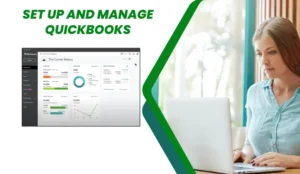QuickBooks has become a staple for small and medium-sized businesses, offering a comprehensive suite of tools to manage finances. But simply having the software isn’t enough. To truly reap its benefits and drive business success, you need to leverage its key features effectively. Here are the top 10 QuickBooks features every business owner should be using:
1. Chart of Accounts Customization:
Think of your Chart of Accounts as the backbone of your financial reporting. QuickBooks offers a default chart, but customizing it to reflect your specific business activities is crucial. This allows you to accurately track revenue streams, expenses, and assets, providing a clear understanding of your financial health. Why it matters: Tailored charts enable accurate reporting, better decision-making, and easier tax preparation.
2. Bank Feeds & Reconciliation:
Manually entering every transaction is time-consuming and prone to errors. QuickBooks’ bank feeds automatically import transactions from your bank and credit card accounts. Regularly reconciling these transactions against your bank statements ensures accuracy and helps identify discrepancies like fraudulent activity or overlooked expenses.
Why it matters: Saves time, reduces errors, and improves financial security.
3. Invoicing & Payment Processing:
Creating professional invoices and getting paid on time is essential for cash flow. QuickBooks allows you to customize invoices with your logo and branding. Integrated payment processing enables customers to pay directly through the invoice, streamlining the process and boosting payment speed.
Why it matters: Enhances professionalism, simplifies payment collection, and improves cash flow.
4. Bill Management & Vendor Tracking:
Keeping track of your bills and managing vendor relationships is crucial for controlling expenses. QuickBooks’ bill management features allow you to record bills, set payment reminders, and track payment history. You can also categorize vendors and generate reports to analyze spending patterns.
Why it matters: Helps manage expenses effectively, improves vendor relationships, and avoids late payment fees.
5. Inventory Management:
If you sell physical products, effective inventory management is vital. QuickBooks’ inventory feature allows you to track product quantities, costs, and sales. You can set reorder points to avoid stockouts and generate reports to analyze product performance.
Why it matters: Optimizes inventory levels, minimizes waste, and improves sales forecasting.
6. Reporting & Analytics:
QuickBooks offers a wide range of pre-built reports, including Profit & Loss statements, Balance Sheets, and Cash Flow statements. Understanding and analyzing these reports provides valuable insights into your business’s financial performance. You can also customize reports to track specific metrics. Why it matters: Provides insights into financial performance, identifies trends, and supports informed decision-making.
7. Payroll Management (or Integration):
Paying employees accurately and on time is paramount. QuickBooks offers payroll management features that automate payroll calculations, tax deductions, and reporting. Alternatively, you can integrate QuickBooks with a dedicated payroll service like Gusto or ADP.
Why it matters: Ensures accurate and timely payroll, simplifies tax compliance, and reduces the risk of payroll errors.
8. Budgeting & Forecasting:
Creating a budget and forecasting future performance is essential for long-term financial planning. QuickBooks allows you to create budgets, track actual vs. budgeted performance, and forecast revenue and expenses. This helps you anticipate challenges, capitalize on opportunities, and make informed investment decisions.
Why it matters: Enables proactive financial planning, identifies potential risks and opportunities, and helps achieve financial goals.
9. Customer Relationship Management (CRM) Integration:
While not a core function, integrating QuickBooks with a CRM system can significantly improve customer management. This allows you to track customer interactions, sales opportunities, and payment history in one centralized location.
Why it matters: Streamlines customer management, improves sales efficiency, and enhances customer satisfaction.
10. Mobile Accessibility:
Modern business demands flexibility. QuickBooks mobile app allows you to access your financial data from anywhere, anytime. You can create invoices, track expenses, and check your bank balance on the go.
Why it matters: Provides real-time access to financial data, enables on-the-go management, and improves responsiveness.
Conclusion:
QuickBooks is a powerful tool that can significantly benefit your business. By mastering these top 10 features, you can gain greater control over your finances, make informed decisions, and ultimately drive profitability. Don’t just use QuickBooks – leverage its full potential to unlock your business’s financial success.




